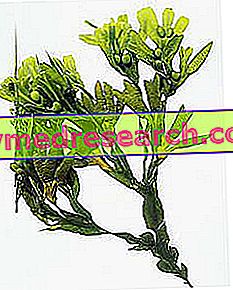See also: natural remedies against cystitis
What is bearberry
Bearberry ( Arctostaphylos uva-ursi - family Ericaceae) holds the scepter of the most useful natural remedy against cystitis and urinary tract infections in general. The drug consists of the leaves collected before flowering, then used fresh or more commonly dried.

It looks like a small evergreen shrub with creeping branches, with dark green leathery leaves; the fruits are globose, red berries, containing an inedible sour and powdery pulp.
The name bearberry derives from the Latin uva ursi, since bears are fond of its fruits.
Active Principles and Property
The main components of bearberry - leaves are phenolic glucosides (5-15%), 6-10% of which are arbutin and methylbutin, whose aglycones (non-sugary part) consist of hydroquinone and methylhydroquinone molecules.
Arbutin: antibacterial activity
At intestinal level, arbutin is precisely hydrolyzed to hydroquinone and glucose; after absorption, hydroquinone is conjugated mainly in the liver, then released into the urine as glucuronide and sulfate.
Bacteria present in the bladder have the ability to deconjugate hydroquinone from glucuronide; the active principle can therefore carry out its antimicrobial action, which in vitro has proved useful against numerous bacterial strains commonly responsible for infections of the urogenital tract.
Other components of the phytocomplex, such as tannins and metabolites of piceoside, perform a synergistic action with arbutin.

It has been postulated as to how part of arbutin is absorbed unchanged in the intestine and that its glucosidic bond is then directly split at bladder level with release of hydroquinone; this hydrolysis would occur spontaneously (without the intervention of bacteria) in a basic environment, hence the need to alkalize the urine by taking sodium bicarbonate (6-8 g / day). However, there is experimental evidence on the uselessness of this practice (moreover, in general, to fight cystitis it is recommended to acidify the urine), also considering that the hydroquinones contained in bearberry exert their antiseptic effects at their best at an urinary acid pH .
Like all the supplements, there are no randomized, double-blind clinical studies in the literature to support the urinary antiseptic activity of the bearberry. There is instead clinical evidence on its preventive efficacy, in addition to the support given by the inevitable empirical findings and by a millennial history of popular use.
Mode of use
The most commonly recommended preparations are the infusion, decoction or cold macerated (3 grams of dry drug in 150 ml of water), to be administered 4 times a day; the consequent fluid intake and the diuretic activity carry out a washing action on the urinary tract, enhancing the antimicrobial activity of arbutin (although they could dilute the active ingredient hydroquinone excessively).
| infusion | Pour the boiling water (1L) on the dried leaves of bearberry (20 g) and leave to rest for a few minutes. Strain and drink 3-4 cups a day. |
| Decoction | A poor spoon (2 grams of powdered leaves) in 150 ml of cold water. Bring to the boil and simmer for 15 minutes. Strain and drink 3-4 cups a day. It is more active than the infusion, since Arbutin dissolves better in boiling water, but is also more bitter. |
| Macerato | Let the leaves rest in cold water for 6-12 hours. This preparation allows to obtain a less rich preparation of tannins, therefore indicated for gastrosensitive subjects, and according to some reports even richer in arbutin. |
It is certainly simpler to take capsules or tablets containing standardized extracts in arbutin, very common on the market and to be taken according to the manufacturer's instructions (generally we recommend taking a daily amount that will make 400-800 mg of hydroquinone derivatives ). In both cases it is recommended to take it away from meals.
Often in phytotherapeutic preparations, bearberry is associated with other natural remedies potentially useful in the presence of urinary tract infections, such as cranberry (Fruits and juice), diuretic drugs (dandelion, wheatgrass, horsetail, goldenrod etc. .), drugs with antispasmodic and anti-inflammatory action (chamomile), blueberry (leaves) and other Ericaceae.
Side effects
Bearberry is contraindicated in physiological conditions such as pregnancy and lactation, and in pathological conditions such as renal failure and allergy to acetylsalicylic acid. Use below 12 years is not recommended.
Beard intake should not last more than a week (or more than five times a year) without consulting your doctor. Read the warnings on the label and do not exceed the doses specified by the manufacturer.
Bearberry tends to give the urine a brown color, which darkens in the air.
The tannins, which in bearberry leaves reach important concentrations (6-7%) but still lower than those of other ericaceae, have an irritating action on the gastric mucosa; also for this reason, prolonged use is not recommended (bearberry can cause nausea and vomiting); this side effect can however be mitigated by adding a pinch of peppermint leaves to the bearberry infusion.
Video
Watch the video
X Watch the video on youtube



